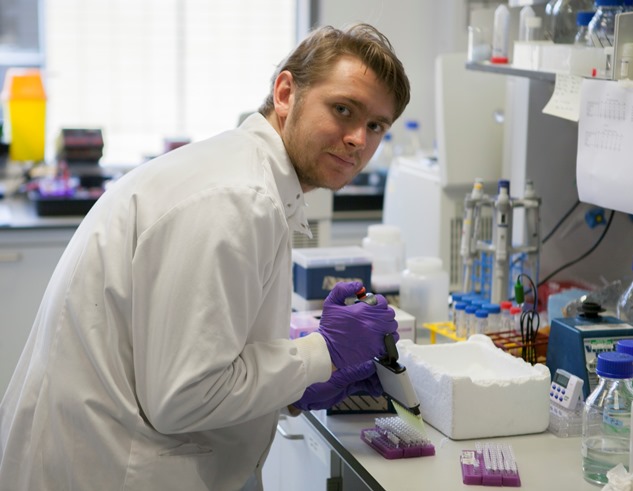The DTP’s research areas address the BBSRC’s core strategic themes . . .
(1) Agriculture & Food Security
The world population is predicted to rise to 9bn people by 2050, and even now 1bn people are malnourished. Delivering food security means ensuring an adequate supply of nutritious, safe food for all in an environmentally sustainable manner. This will require the boosting of yields and nutritional content, and reducing wastage and spoilage while decreasing inputs of energy, water, fertilizers and agrochemicals against the background of climate change. Bioscience has a crucial role to play alongside other disciplines. Mechanistic biology can provide understanding of and the ability to optimize crucial plant processes to address the ‘yield gap’ which is the difference between the potential and actual productivity. It can develop new and more environmentally friendly methods of controlling pests and diseases and reducing post harvest losses through spoilage.
The consortium has critical mass in this priority area of research, which continues to be supported by on-going investment. The York Environmental Sustainability Institute, the P3: Plant Production and Protection and the Africa College initiatives directly address the AFS priority by utilising the results of our interdisciplinary fundamental science to simulate every major agricultural biome.
A joint initiative has been established between York and Fera in Agrifood Resilience, which brings together scientific expertise to focus on food and non-food crop production systems. Outstanding plant growth facilities together with the 265- hectare Leeds University experimental farm are available to our students; the farm consists of arable land growing wheat, barley, oil seed rape, vining peas and potatoes in rotation. For Plant Sciences the farm provides rain out shelters, test plots and field scale sites including field scale trials with GM crops, as well as providing pollinator plots, honey bee hives, crayfish ponds, small mammal trapping, soil sensors and a weather station. The farm is used in collaborations with the Universities of York and Sheffield, Fera and Askham Bryan College. It is a National Institute of Agricultural Botany test site and underpins our future research plans in the area of AFS by providing access to important macroscale facilities.
(2) Industrial Biotechnology and Bioenergy
Energy and industrial materials from novel biological sources, reducing dependency on petrochemicals and helping the UK to become a low carbon economy
The challenge to position the UK as a low carbon economy, and meeting international targets for reducing emissions, requires a transformation in the way we produce and use energy, transport fuels, chemicals and industrial feedstocks.
The DTP undertakes research in this area using biological systems and resources for processing materials and chemicals and producing fuel in a sustainable way. Researchers in the White Rose DTP partnership are working on innovative projects to underpin the needs of industry and reduce our reliance on fossil fuels.
At York, CNAP is developing biorenewable feedstocks for plant oils and speciality chemicals for industry. CNAP is a core member of the BBSRC Sustainable Bioenergy Centre (BSBEC) and is developing biomass as a renewable biorefinery feedstock and discovering new enzymes for biomass processing. York’s Structural Biology Laboratory in the Department of Chemistry has a long tradition of working with industry on the structural characterisation of enzymes and use of enzymes as biocatalysts.
Researchers at the Astbury Centre for Structural Molecular Biology at Leeds also have expertise in enzyme engineering. Substantial institutional investment in BSTG (the BioScreening Technology Group has led to the development of a proprietary Adhiron™ artificial binding protein library.
The Department of Chemical and Biological Engineering at Sheffield has interests in the exploitation of extremophiles for pharmaceuticals and biofuels, as well strong expertise in bioprocess engineering. ChELSI is an interdisciplinary institute that provides space and state-of-the-art analytical facilities to enable life scientists and chemical engineers to develop innovative research in the key areas of Biomanufacturing and Energy.
Our consortium hosts three BBSRC Networks in Industrial Biotechnology and Bioenergy (NIBB):
- High Value Chemicals from Plants Network
- Plant Biomass Biorefinery Network
- Crossing Biological Membranes Network (CBMnet)
(3) World Class Underpinning Bioscience
World-class bioscience is at the heart of our DTP as it underpins the translational and strategic aspects. The White Rose DTP boasts one of the largest groupings of mechanistic biologists in the UK, studying basic, life governing, processes from the cellular to the atomic level as a research strength of all three partners. The power of our research comes from combining techniques such as imaging with other approaches such as structural and analytical methods.
The Astbury Centre for Structural Molecular Biology is a world-leading research centre that brings together researchers from Biology, Chemistry, Physics and other disciplines with the aim of aim of understanding the molecular basis of biological mechanism in living cells. In recent years, all three universities were awarded substantial funds as part of the MRC Next Generation Optical Microscopy initiative. Our DTP benefits from highly successful training modules offered by the Bioscience Technology Facility at York, which provide training, access and support for DTP students. Institutional investments at Sheffield have brought together groups of researchers across the University in the Imagine: Imaging Life initiative – the aim of this group is to apply state of the art microscopy technologies to elucidate the detailed architecture and cellular interactions of biological systems, from individual molecules to whole tissue assemblies.
The Leeds Institute for Data Analytics provides access to high-performance computing. Initiatives that have further strengthened our ability to offer key training opportunities in the WCB area include: the Florey Institute for Host Pathogen Interactions and The Centre for Immunology & Infection. These act as hubs for research projects at the interface of biology and health research to promote fundamental and translational research. There is also the York Centre for Complex Systems Analysis (YCCSA), which is an inter-departmental centre devoted to modelling and analysing complex biological, physical and social systems and embeds a ‘systems’ approach to our research activities. Highlights include a BBSRC LoLa involving Leeds with Cambridge, Birmingham and Manchester, which is involved in regulatory network inference from new generation sequencing and other data.
We are at the forefront of method development . . .
- York: Hyperpolarisation NMR as a means of enhancing sensitivity in biological MRI and development of macromolecular crystallography software through CCP4
- Leeds: Single molecule force spectroscopy
- Sheffield: Super resolution microscopy for bacterial cell biology
- Leeds & RCaH: Development of TeraHz spectroscopy for analysis of protein dynamics
Research highlights include . . .
- Leeds: The use of cryo-EM to reveal the molecular mechanism of dynein, published in Cell
- Sheffield: Combining structural biology, bioinformatics and biochemical approaches to identify Burkholderia virulence factors in collaboration with colleagues in Exeter, Malaysia and Singapore, published in Science
- York & Leeds: Highly interdisciplinary research exploiting novel mathematics in tiling theory (York) with biochemical/biophysical characterisation (Leeds) to provide powerful insights into virus structure and assembly




